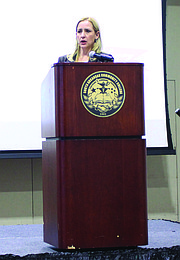Nearly 18 million people are victims of identity theft every year in the United States.
Arkansas Attorney General Leslie Rutledge spoke about cyber security, identity theft and internet safety Monday as part of the first annual South Arkansas Community College CyberExpo.
Identity theft is a crime that occurs when someone uses another person’s personal information without their permission, to commit fraud or other crimes, most commonly used to access credit in their name. Identity theft can be obtained by using personal information including Social Security number, Driver’s License number, bank account number, credit card number, passwords or any other pieces of information that can be used to gain access to a person’s financial resources or identity.
According to the Attorney General’s website, there are certain steps a person can take to avoid becoming a victim, including:
• “Protecting your mail: Send and receive mail safely. Mail your bills from a secure location and do not leave sensitive mail sitting in your mailbox for extended periods.
• Shred documents with personal information.
• Keep a close eye on personal documents and credit cards. The most common form of identity theft continues to be obtaining personal information through lost or stolen documents, checkbooks or credit cards.
• Be careful about where you store your information at home. Do not leave financial records lying around your house for prying eyes to see.
• Be safe online, which includes using anti-virus and anti-spyware software. Avoid using obvious passwords like your birth date, mother’s maiden name or the last four digits of your Social Security number.
• Do not share personal information over the internet. Never respond to an email that asks you to give personal information over the internet. Legitimate companies will not ask for bank account numbers.
• Beware of giving personal information over the phone. Know who you are dealing with and when in doubt, hang up and get the business’s phone number from an independent source.”
Rutledge emphasized that identity theft can happen to anyone - and that it may be someone much closer to the victim who is responsible.
“It’s not strangers that steal this information, it’s people you know,” Rutledge said. “The Better Business Bureau did a survey that said you are just as likely to have your identity stolen by a relative, close friend or acquaintance than you are to have it stolen online.”
Rutledge advises reviewing bank statements regularly and looking for any unusual activity.
Red flags include receiving unexpected bills or collection calls, not receiving expected bills or account statements and having a credit application denied when there is no reason to believe there is a problem with the credit history.
“If you think you may be a victim of identity theft you should first file a fraud alert with one of the three national credit bureaus TransUnion, Experian or Equifax,” according to the Attorney General’s website. “You should also file an identity theft report with your local law enforcement agency and close any accounts that have been tampered with.”
For more information concerning identity theft, visit the Attorney General’s website at www.arkansasag.gov.
Kaitlyn Rigdon can be reached at 870-862-6611 or [email protected].

